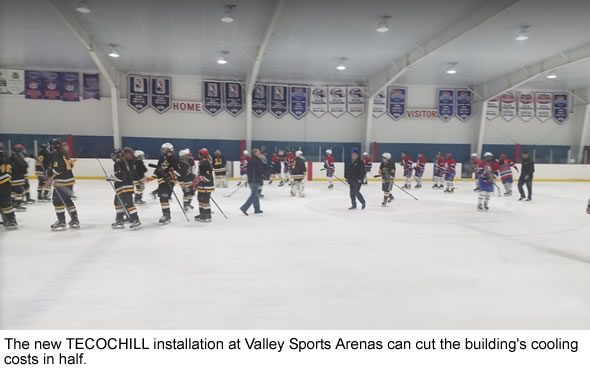How Tecogen’s Natural Gas-Engine Driven Chiller Provides Significant Cost Savings to Massachusetts Ice Rink
Tecogen Inc. (TGEN – $3.68) took a 200 tons TECOCHILL natural gas-engine driven chiller into operation at the Valley Sports Arenas ice rink in Concord, MA. The TECOCHILL system provides Valley Sports with a reliable, proven, efficient, and cost-effective alternative to the conventional electric motor-powered chiller, which it replaced.
The #1 cost of operating a rink is making the ice, as the glycol-water mixture that circulates beneath the ice sheet at the rink, has to be maintained at 15ºF. This is where the TECOCHILL stands out. It can cut a building’s cooling cost in half by eliminating most of the electrical demand (kW) associated with providing cooling.
In addition to using low-cost natural gas, the engine-driven chiller provides added efficiency and economy through heat recovered from the engine and the engine exhaust gases. This high-quality heat source (up to 230°F hot water) literally comes for free, whenever the chiller is running, and can be used throughout the sports complex.
Moreover, state-based incentives for natural gas-engine driven chillers are a boon for ice rinks across the Northeastern states. Rinks can qualify for incentives for both the thermal savings and for the electricity that a chiller removes from the grid. In Massachusetts, for example, an incentive of between $0.25 and $0.30 per kilowatt hour that is removed from the grid, is provided. In this particular case, Valley Sports qualified for an $87,000 custom incentive from National Grid.
Other states, such as Connecticut, New Jersey and Pennsylvania also offer incentives for similar installations. These incentives are mainly designed to cover the majority of the incremental cost, thereby encouraging customers to make the energy efficient choice.

Ice Rink Benefits
In the particular case of ice rinks, the TECOCHILL adds several other benefits.
First, the chiller’s heat recovery can provide the hot water for the Zamboni machine. Each time the Zamboni resurfaces the ice, it deposits hundreds of gallons of hot water onto the ice surface. The hot water melts the top of the ice and freezes to form a fresh, smooth surface. By using the hot water byproduct from the chiller, the rink will be cutting its overall energy usage.
In addition, as a natural gas-fired chiller significantly reduces the cost to cool the ice sheet, operating costs are low enough to keep the rink open for skating beyond its usual October-to-March skating season.
And finally, in some instances, a TECOCHILL can also supply comfort cooling during the summer months, making it possible to use the rink as a recreation hall.
Conclusion
The installation at Valley Sports Arenas again shows the vast cost savings that can be achieved with a natural gas-powered chiller. They reduce a building’s on-peak electrical demand (kW) and energy (kWh) charges, especially in the summertime when electric rates are at their highest, and when natural gas is “off-peak” and quite affordable.
TECOCHILL is the only natural gas engine-driven chiller on the North American market in its size range. The chillers are available in capacities ranging from 25 to 400 tons, with the smaller units air-cooled and the larger ones water-cooled. They are ideal in facilities where new chilling capacity is desired, as replacements for aging electric chilling equipment, where the local electric utility’s kW demand charges are high, or where the site’s electrical capacity is limited.
Basically, they make sense wherever large chillers are needed, including hospitals, colleges, schools, office buildings, aquariums, government buildings, large residential facilities, industrial facilities, hotels, and… ice rinks.
A final advantage for Tecogen is that in many cases, such as ice rinks, a chiller is non-optional. The ice sheet needs to be cooled period. This is very important as many aging installations are in dire need of replacement. Buy recommendation.
| Smallcaps.us Advice: Buy | Price Target: $9.41 | Latest Company Report (pdf) |
| For important disclosures, please read our disclaimer. | ||
